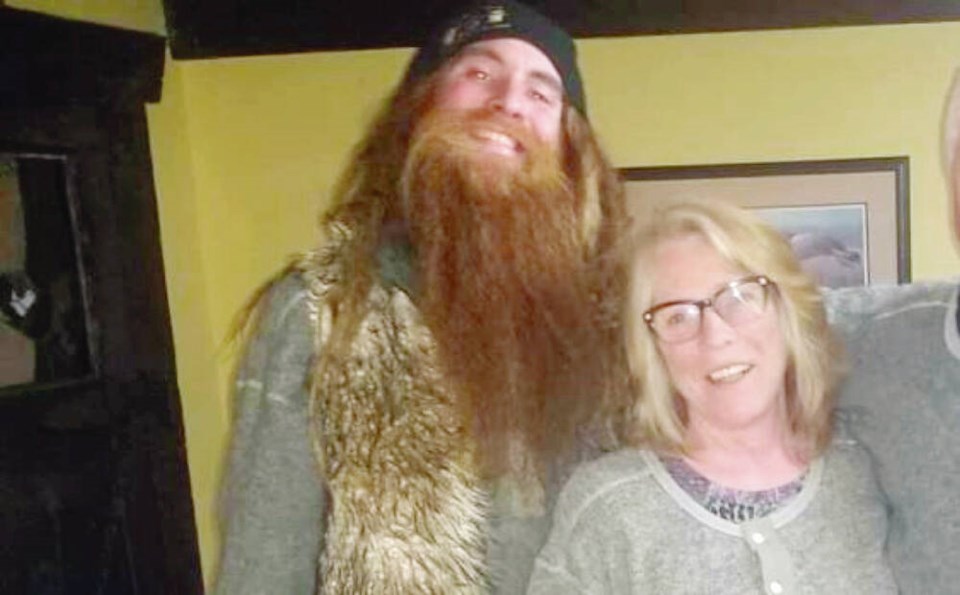At 3 p.m. on Aug. 29, 2021, Jesse McPhee sent a text to his mother, Samantha Jesselynn Dittmer.
“You are mentally ill and I love you. I think you should seek help.”
Three hours later, the 37-year-old Port Alberni man was lying face-down in a pool of blood, shot to death at point-blank range with a hunting rifle, the Crown said, as Dittmer’s trial for the second-degree murder of her son began in B.C. Supreme Court in Port Alberni.
Prosecutor Gordon Baines told the jury that McPhee lived with his girlfriend, Brandy Kazakoff, in a suite on the main floor of a house at 3131 18th Ave. in Port Alberni. Dittmer, who was 61 at the time, owned the house and lived on the top floor.
In August 2021, Dittmer was under the care of a doctor for anxiety and panic attacks, said Baines, brought on by the stress of a messy divorce her son was going through.
There were lawsuits and both McPhee and Dittmer were concerned that men associated with his ex-wife would come to Port Alberni and harm them.
On Aug. 25, Dittmer’s panic attacks were so severe she went to the emergency room at West Coast General Hospital. She was seen by a doctor and referred to Port Alberni mental health services for support, said Baines.
On the morning of Aug. 29, Kazakoff, McPhee and Dittmer went to Great Central Lake, 16 kilometres west of Port Alberni, to look at a property. Later in the afternoon, after they returned home, Dittmer and McPhee had a loud argument, said Baines.
Dittmer left the home in her car. At 3 p.m., McPhee sent the text telling her she should seek help.
Dittmer returned home at 5:37 p.m. and tried calling her son about 10 minutes later.
McPhee and Kazakoff were preparing dinner and planning to watch Netflix. At 6:04 p.m., McPhee called his mother. That call lasted 19 seconds, said Baines.
Kazakoff was sitting outside, knitting on a small deck at the back of the suite when she heard a gunshot.
She ran inside and saw Dittmer standing about five feet from McPhee, who was face- down on the floor. Dittmer was holding a long gun that Kazakoff believed was a shotgun, said Baines.
Dittmer told her to call 911 and walked away. Kazakoff called 911 and told them Dittmer had shot her son.
The jury can expect to hear evidence from a neighbour who overheard a loud argument and an “aggressive threatening female voice” coming from Dittmer’s house, said Baines.
The witness is expected to testify that he heard a loud bang around 6 p.m. and saw a distraught woman come out of the house and walk up the street, where she was met by a police officer.
Police officers are expected to testify about arresting Dittmer and finding McPhee on the kitchen floor. Officers are also expected to tell the jury that they executed a search warrant at the house the next day and found a .270 Winchester rifle under the bed in Dittmer’s bedroom.
On Tuesday, forensic pathologist Dr. Elizabeth Brooks-Lim testified that McPhee died almost instantaneously from a single gunshot wound to his chest.
Brooks-Lim testified that she believed the muzzle of the firearm was pressed close to McPhee’s chest.
The bullet went through his right chest and injured his ribs on the right side, his right lung and the sac around his heart.
The bullet had gone straight through the heart and hit the great vessels of the chest, Brooks-Lim testified. His windpipe and left lung were also injured.
“His death would have been near instantaneous,” she said.
The trial is expected to take five weeks.



